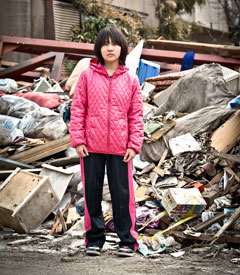Support justice-driven, accurate and transparent news — make a quick donation to Truthout today!
Tokyo – Since the horrific Mar. 11 earthquake and tsunami that devastated her coastal town of Minato, in Ishinomaki city, Masami Endo’s three-year-old daughter has been crying and clinging to her every night.
“My daughter, Sakura, has never cried in fear of darkness till this disaster. She is completely different to the rather cheerful but also kind of stoic child she was before,” Endo, a single mother, told IPS.
Endo is very worried about her child. The two of them watched the tsunami swarm into their town and through the first floor of their house, destroying the structure badly. Ishinomaki is located in Miyagi- prefecture, about 330 kilometres north of Tokyo.
The story of Sakura is just one example of the thousands of tales of similar distress now told by survivors of the magnitude 9.0 earthquake and massive tsunami that devastated the northern coastline of Japan.
Gender specialists also hasten to add that the worst effects have been on women, children and the elderly – some of them still living in evacuation centres. They represent vulnerable groups at the worst risk during disasters, and therefore need help as quickly possible.
“One month since the disaster, the focus is now on helping women and their children. We need to act quickly to make sure their needs are met to prevent new problems from occurring in the recovery process,” said Hirano Keiko, head of the Morioka Women’s Centre, linked to Oxfam Japan, that is providing emergency goods for women.
As the initial shock of the worst post-war natural disaster to hit Japan recedes slowly, many women’s groups and gender organisations are moving fast to reach out to affected women.
“There is one word that describes the situation for women affected by the disaster and that is ‘patience’ in the extreme sense,” explained Yasuko Arai, spokesperson for the Sendai Gender Equality Association, linked to the Sendai City government. “They have tolerated horrific conditions in evacuations centres that extend them little privacy, they have lost their close relatives including children, and have become single mothers overnight.”
Sendai is the largest city in the Tohoku region. According to Arai, the quake and tsunami wreaked the most havoc in small coastal fishing villages and farming areas in the region.
Arai says the gender equality department is now setting up a new network to support women. The network will assist in collecting testimony, making lists of special needs, and will also urge women to speak their mind on which directions recovery operations should take.
“Traditional social culture has restricted women from speaking out their opinions,” Arai explains. “This was against the norm where men were expected to be the leaders. The time has come to change this pattern.”
While local police have meticulously tabulated figures of the dead and missing, the gender breakdown of this data remains unknown. Rough calculations by Asahi newspapers released this week indicate that the elderly represent more than 55 percent, or 13,000 fatalities, in the 12 affected prefectures.
More than 15,000 people still remain missing.
Kaori Tano, head of the single mother association of Koriyama city, in Fukushima prefecture, survived the quake which destroyed parts of her home, but is now spearheading a movement to provide counselling and advice to her counterparts who have lost everything.
“Single women who lived alone and lost everything face huge problems,” said Tano. “The women who call me say they face constant anxiety and stress because they do not know how they can carry on.”
The group has 75 members and Tano is busy evaluating the needs of each one of them. The picture that is emerging, she says, is that affected single women have been bottling up their desperation as they grapple with such issues as finding new homes, maintaining jobs, as well as trying to secure their physical security.
Tano and her volunteer staff have begun visiting evacuation centres in Fukushima. Concerns and fears women express to them include: preventing former husbands from finding them, anxiety over lost employment, difficulty maintaining current jobs because they cannot find child care in the evacuation centres, and general lack of mental counselling services for women.
“What is also obvious is their reluctance to ask for help for these issues,” Tano said. “The women feel they would appear selfish and demanding if they requested the authorities for such help because officials are too busy with more important concerns.”
Social support groups are also bracing for a surge in single women-headed households – after deaths of husbands or fathers in the disaster.
Ashinaga Ikueikai, a leading non-profit group providing scholarships to support students, says initial figures they have received indicate more than 100 disaster orphans and almost 2,000 children who have lost one parent.
“More than 60 percent of our scholarships are extended to children who live with only their mothers because they face the highest poverty levels. This figure will rise in Tohoku,” said Yoji Yamamoto, who is in charge of Ashinaga Ikueikai’s disaster support programme
Trump is silencing political dissent. We appeal for your support.
Progressive nonprofits are the latest target caught in Trump’s crosshairs. With the aim of eliminating political opposition, Trump and his sycophants are working to curb government funding, constrain private foundations, and even cut tax-exempt status from organizations he dislikes.
We’re concerned, because Truthout is not immune to such bad-faith attacks.
We can only resist Trump’s attacks by cultivating a strong base of support. The right-wing mediasphere is funded comfortably by billionaire owners and venture capitalist philanthropists. At Truthout, we have you.
Truthout has launched a fundraiser, and we have only 72 hours left to raise $24,000. Please take a meaningful action in the fight against authoritarianism: make a one-time or monthly donation to Truthout. If you have the means, please dig deep.
